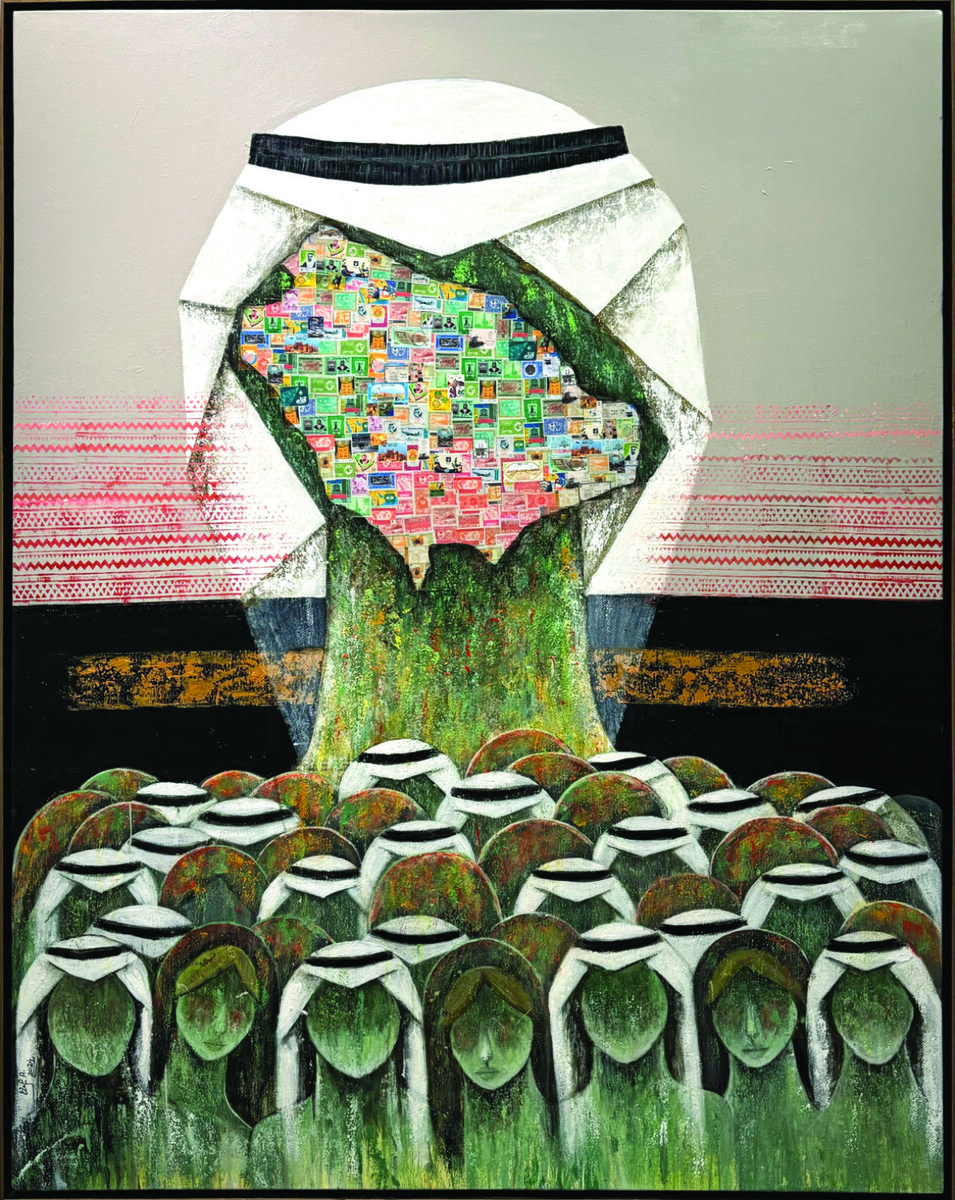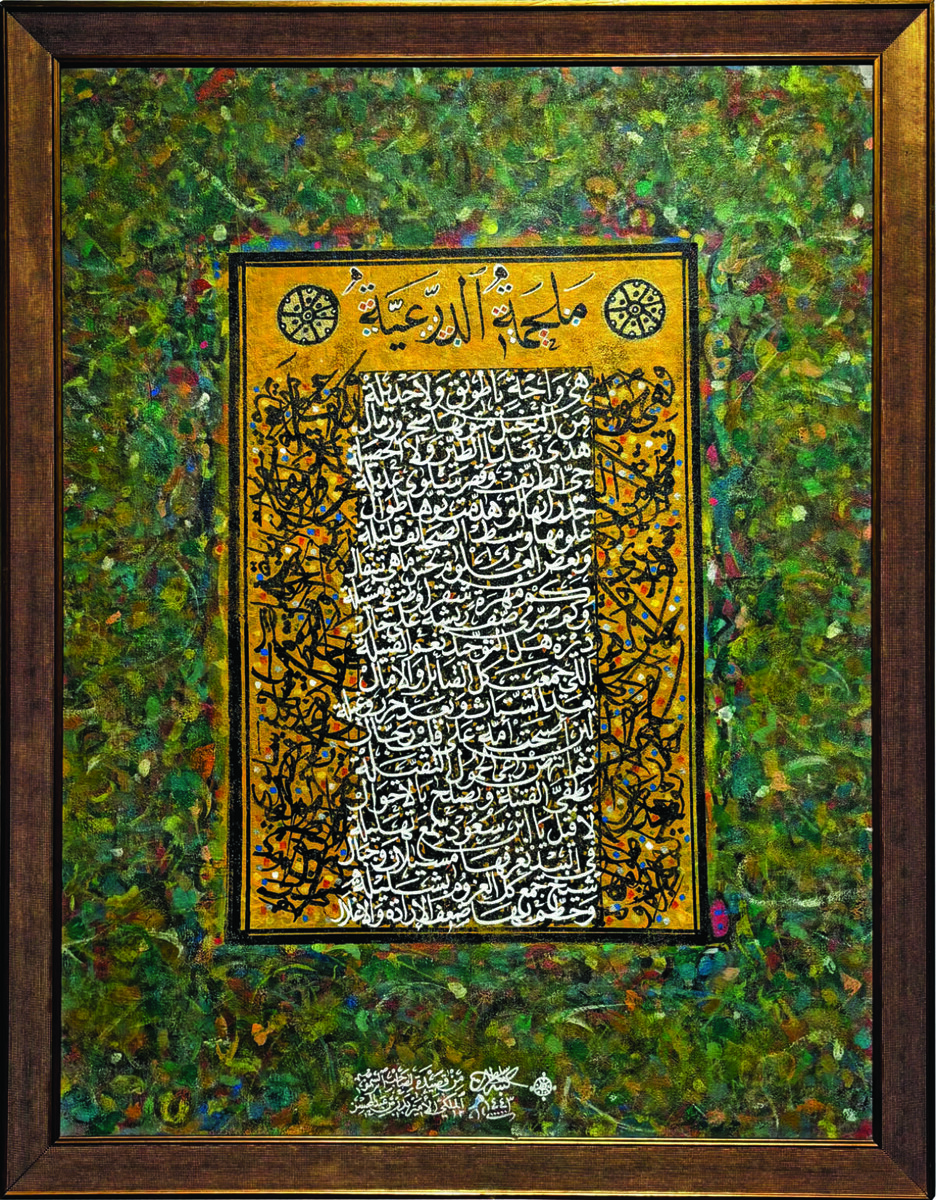RIYADH: To mark the 94th Saudi National Day, Naila Gallery in Riyadh is inviting visitors on a visual and sensory journey that intertwines the past, present and future of the Kingdom.
Running until Oct. 5, the exhibition features a diverse range of both Saudi and international artists, a reflection not just of Saudi Arabia’s artistic growth but also a symbol of its global reach and influence.
As you step into the gallery, the atmosphere immediately immerses you in a world where colors blend with history, and every brushstroke tells a compelling story of the Kingdom.

The works on display span themes of resilience, nostalgia, unity and pride — emotions that tie in to the Kingdom’s national identity. (Supplied)
The space is decorated with paintings and sculptures that capture the essence of Saudi heritage. The works on display span themes of resilience, nostalgia, unity and pride — emotions that tie in to the Kingdom’s national identity.
Ameera Al-Zaben, the gallery manager, told Arab News: “This is more than an art display — it is a celebration of the nation’s soul. Every piece in this exhibition reflects the landscapes, traditions and dreams that make Saudi Arabia what it is today.
HIGHLIGHTS
• The featured works at Naila Gallery’s National Day exhibition range from vibrant paintings to intricate sculptures, capturing everything from the grandeur of Saudi landscapes to the intricacies of daily life.
• Saudi artists featured include Abdullah Al-Almaai and Alia Al-Harbi, all contributing to cultural dialogue through their own lenses.
“Art becomes a bridge connecting hearts, transcending borders and fostering unity through shared history.”
Whether it is the towering palm trees symbolizing Saudi resilience or depictions of the traditional mud houses that whisper the stories of Saudi ancestors, every artwork tells a tale.

Running until Oct. 5, the exhibition at Naila Gallery in the Kingdom’s capital features a diverse range of both Saudi and international artists reflecting Saudi Arabia’s global reach and influence. (Supplied)
As visitors move through the gallery, they are not just spectators but participants in a journey of reflection, nostalgia and pride for their homeland.
One of the most powerful pieces in the exhibition is Jackie Leger’s screen print “King with Philby — Gold Sandstorm,” which depicts the intersection of heritage and modern artistic innovation. This fusion of the past and present is a recurring theme in Leger’s work.
Leger, who has been photographing and documenting Saudi Arabia since 1999, reflected on the impact of historical photography on her art in an interview with Arab News.
“In the beginning, I was photographing and documenting mostly scenes going to the souq, finding joy, finding imagery ... then I started traveling to all the sites of battles and other historical notes that might be interesting for us ... and that’s where it all started,” she said.
In her pieces, Leger draws inspiration from iconic images of early explorers and photographers such as Captain William Henry Irvine Shakespear, a British officer who documented key moments in Saudi Arabia’s early formation.
One of Shakespear’s most famous photographs of King Abdulaziz remains a powerful symbol of Saudi history. Leger said: “The first two most important pictures of the country remain today iconic. This brought me into the story ... and I thought it should be written about.”
The gallery is also presenting various Saudi artists contributing to cultural dialogue through their own lenses. From Abdullah Al-Almaai’s striking use of colors to express the vibrancy of Saudi landscapes to Alia Al-Harbi’s intricate designs that explore the intersection of modernity and tradition, these artists are at the forefront of the exhibition’s narrative.
International contributions come from artists such as Belgian painter Eva Claessens and Indian artist Vinny Venugopal, who provide a global perspective on Saudi culture, emphasizing the Kingdom’s growing influence in the international art scene. Their artworks also explore themes of cross-cultural exchange and global unity.
The featured works range from vibrant paintings to intricate sculptures, capturing everything from the grandeur of Saudi landscapes to the intricacies of daily life, reminding viewers of the powerful role art plays in shaping and preserving culture. Each artist, with their distinct style and vision, plays a pivotal role in celebrating the richness of Saudi culture.
One of the standout elements of the exhibition is the introduction of jareesh chocolate — a culinary creation by renowned Middle Eastern food artist Omar Sartawi.
Sartawi, known for his molecular gastronomic innovations, partnered with Diplomat Sweets to create a fusion of jareesh, a traditional Saudi dish made with cracked wheat and white chocolate.
By combining jareesh with locally handcrafted chocolate, Sartawi breathes new life into this age-old recipe, blending tradition with modern culinary techniques.
“Jareesh is kind of a 2,000-year-old ingredient, so how do you turn it into something modern?” Sartawi said. “It’s mild and mellow, and creating the perfect balance with chocolate was a challenge. But this creation allows people to take a piece of Saudi heritage with them anywhere in the world — it’s a cultural product, a celebration of who we are.”
Sartawi’s innovation perfectly embodies the spirit of Saudi Arabia’s modern vision, which embraces cultural preservation alongside bold steps into the future.
Another highlight of the exhibition is the launch of the cookbook “Cooking Heritage: Saudi Arabia,” a work that explores the Kingdom’s culture through its culinary traditions. Authored by five experts, the book captures the richness of Saudi cuisine, featuring authentic dishes from across the Kingdom, many of which have been passed down through generations.
Jacquline Jackman, one of the co-authors, told Arab News: “The idea behind participating in this exhibition at Naila Gallery is to celebrate Saudi National Day by honoring Saudi cuisine as an integral part of that celebration.
“This cookbook is a testament to the power of food in uniting people, and it allows readers to take home a piece of Saudi culture to cherish and share.”
The cookbook, much like the artwork in the gallery, reflects a deep connection to the Kingdom’s roots, but also its openness to evolution and exchange. Visitors are invited to browse the beautifully crafted pages, which include traditional recipes such as kabsa, jareesh and other regional specialties, offering a culinary journey through Saudi Arabia’s diverse provinces.
As Saudi Arabia continues its journey of growth and modernization, the exhibition serves as a reminder of the importance of preserving and celebrating the culture that has shaped its people.































